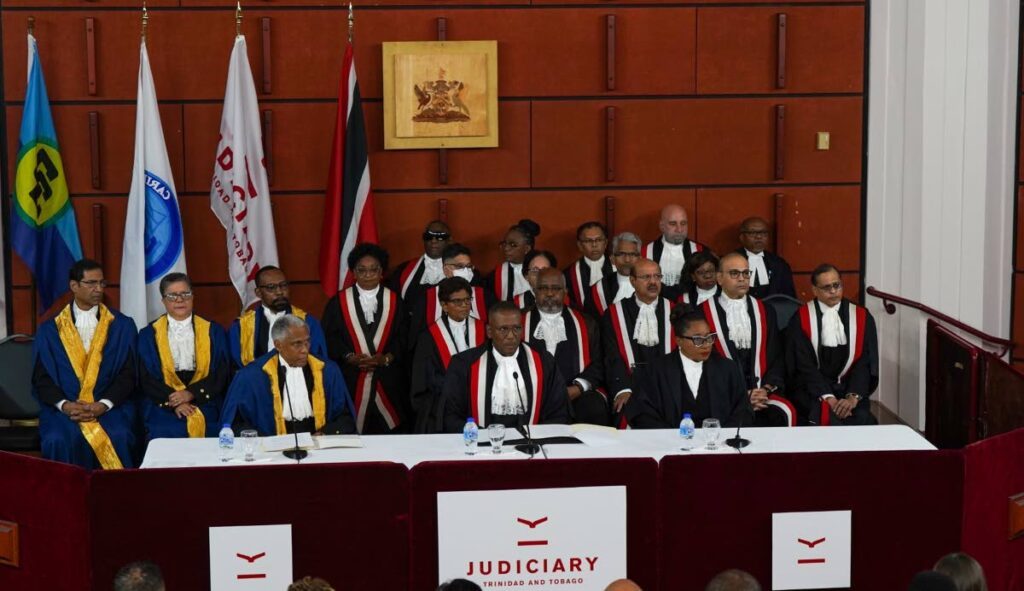Legal figures: Michael de la Bastide lived large

FORMER chief justice Michael de la Bastide worked assiduously Tajmool Hosein at the law but was also a kindly mentor to juniors and a man filled with a love of life, legal colleagues fondly recalled on April 12.
Many tributes flowed – attesting to both his professional and personal traits – at a joint special sitting of the Trinidad and Tobago Appeal Court and the Caribbean Court of Justice (CCJ) at the Hall of Justice, Port of Spain, attended by President Christine Kangaloo.
Chief Justice Ivor Archie hailed de la Bastide's "kindness and generosity of spirit." Saying the chief justice's job was lonely, he said that during "my own challenging time," de la Bastide had been there for him and had kindly agreed to pray with him. He said de la Bastide was "confident, strong and determined in the bullring of the court", yet otherwise would put people at ease and be quite affable.
"He was remarkably kind."
De la Bastide was a leader and a mentor both at the bar (among attorneys) and at the bench (among judges).
"If he had to buff you, you were not torn to shreds, but allowed to retain your dignity."
Archie recalled a case when he was junior to Tajmool Hosein, QC, against de la Bastide, whom he likened to a bull, as being "thorough and relentless."
Yet de la Bastide was polite and gracious and had left a positive impression.
"I was inspired to return home by his vision to modernise the judiciary."
Archie hailed de la Bastide's role as chief justice in fighting for better terms and conditions for judges, who often take a cut in earnings when joining the judiciary from private practice, as de la Bastide himself had done. His move to have attorneys apply to become judges had been novel, but was now the practice even in the UK.
Archie recalled de la Bastide as being prolific at the Appeal Court, delivering 200 judgements. Able to absorb much information in a flash, he would discuss with colleagues his legal research into a case, but on the day in court you would not know what he was going to say.
Archie hailed him as chief justice for his interest in his judges and his willingness to mentor them.
"He was a hard taskmaster. He had me rotating between family, civil and criminal courts. He was stretching me for a greater role," Archie said, seemingly hinting at his own becoming chief justice.
"He did not have a malicious bone in his body," Archie said, saying de la Bastide trusted people and thought them inherently good, but abhorred laziness and lying.
"He had our respect. You also felt quite valued."
He also recalled de la Bastide's wry sense of humour, as a master of the devastating comeback.
"So much of what is good about the judiciary today, we owe to him."
CCJ President Adrian Saunders recalled that as a law student he knew de la Bastide as a law tutor who was not impressed by any lack of effort or preparedness.
Viewing him as "a progressive, forward-looking chief justice," Saunders hailed the profound reforms in Caribbean judicial administration under de la Bastide as CCJ head.
He hailed his "fierce determination to advance Caribbean jurisprudence."
CCJ registrar Gabrielle Figaro-Roberts said the entire Caribbean benefited from de la Bastide's erudition and administrative skills.
Even before heading the CCJ, he had championed the development of a Caribbean jurisprudence reflecting the region's uniqueness. Not only did he insist the CCJ meet international standards, but it must further set standards of its own, she said, citing the words of CCJ librarian Sheryl Washington-Vialva.
Retired judge Rolston Nelson said since his days at St Mary's College, Port of Spain, de la Bastide became aware of his intellectual gifts. He compared de la Bastide's acumen to Sir Hugh Wooding, and said de la Bastide was a great admirer of Caribbean jurist Telford Georges.
Nelson hailed de la Bastide for defending the judiciary's independence against executive encroachment, in a matter that led to a commission of inquiry by former UK chancellor Lord Mackay of Clashfern.
Attorney General Reginald Armour, SC, said as young attorney he could always get de la Bastide's support and guidance. However he said de la Bastide abhorred incompetence, inefficiency and inertia as much as injustice.
Director of Public Prosecutions (DPP) Roger Gaspard, SC, said everyone participating in a trial left court feeling they had a say under de la Bastide as a judge.

Comments
"Legal figures: Michael de la Bastide lived large"